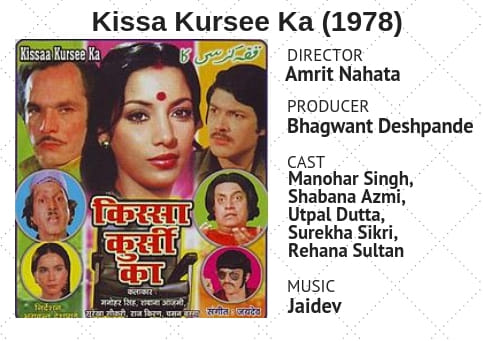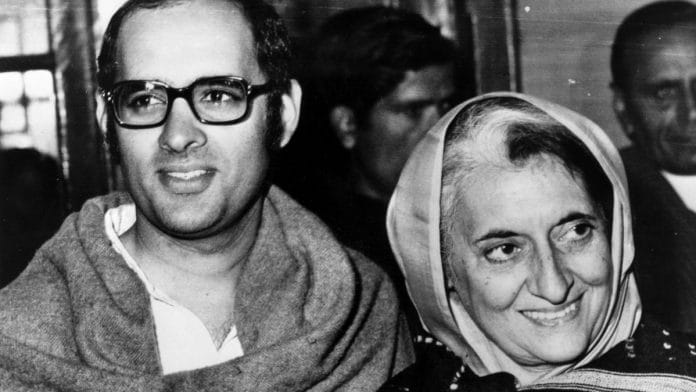Indian politicians aren’t much of a sport where political satires are concerned. In Mamata Banerjee-ruled West Bengal, the treatment inflicted on Anik Dutta’s recent release, Bhobishyoter Bhoot, is just another addition in the long list of films that have faced the wrath of politicians and governments in independent India. While Dutta may have for now managed to draw the Supreme Court’s attention, uncertainty looms large over the eventual fate of his humorous political commentary. However, the ghost of political, and thus legal, scrutiny on a film satirically targeting the power class owes largely to what happened to one of India’s first political spoofs, Amrit Nahata’s Kissa Kursee Ka.
 The film, made at the time of Emergency in 1975, sparked such outrage amongst the political class led by former prime minister Indira Gandhi’s son Sanjay Gandhi that the Congress leader and a few others destroyed the film’s prints. Sanjay Gandhi and former information and broadcasting minister VC Shukla were found guilty by the Shah commission investigating cases of atrocities during the Emergency, and jailed for a month.
The film, made at the time of Emergency in 1975, sparked such outrage amongst the political class led by former prime minister Indira Gandhi’s son Sanjay Gandhi that the Congress leader and a few others destroyed the film’s prints. Sanjay Gandhi and former information and broadcasting minister VC Shukla were found guilty by the Shah commission investigating cases of atrocities during the Emergency, and jailed for a month.
Nahata shot the film again, replacing lead actor Shabana Azmi with Katy Mirza, and although it released in 1978, the film found little traction at the box office. The bootlegged original version that can be found online tell us about all the reasons that may have made the Gandhi clan do everything in its capacity to ensure the stinging film, albeit in a humorous way, never sees the light of a silver screen.
Also read: From Nehru to Modi, Bollywood always faced political attacks but this capitulation is new
Kissa Kursee Ka was directed by Amrit Nahata, a two-time Congress MP who later joined the Janata Party and served another term in the Lok Sabha. The film is now considered one of Bollywood’s best political dramas with the original star cast featuring Manohar Singh, Shabana Azmi, Utpal Dutt, Surekha Sikri, Rehana Sultan and others. It maps the political trajectory of a quack drug seller, Gangaram’s (Manohar Singh) rise to become the president of Jan Gan Desh. Kissa Kursee Ka shows us how a politician can be ‘manufactured’ — said to be a spoof on Sanjay Gandhi’s auto manufacturing project — when capitalist forces come together.
Kissa Kursee Ka is a cinematic jab at the draconian Indira Gandhi government that declared the Emergency in 1975. Although the movie takes place in a fictional country, it withholds some startling references to Gandhi’s government. Gangaram’s party symbol is a car, referring to Sanjay Gandhi’s failed Maruti project, Indira Gandhi’s iconic Garibi Hatao slogan, and a mass drive to kill rats eating away grains featured in the film can be read as a subtle reference to Sanjay Gandhi’s mass sterilisation programme which contributed to Congress’ defeat in the 1977 general elections by the Janata Party.
The controversial film follows a Federico Fellini-style parody with Shabana Azmi playing the role of the country’s citizens — she is named ‘Janata’ (public). Like any citizen of a ‘democratic’ country, Janata is unable to speak and bears most of the brunt of corrupt politicians driven by money. Surekha Sikri, on the other hand, plays a fiery cabinet minister Meera Devi who introduces Gangaram to politics. She is granted some of the strongest dialogues in the film that lays bare the politicians’ greed. Years later, Azmi will play a role similar in Vishal Bhardwaj’s Matru Ki Bijlee Ka Mandola (2013).
Also read: Mumbai’s not Hollywood, which is why we barely have films on the Emergency
Kissa Kursee Ka stands out because of its incredible narrative that ties in poverty, corruption in foreign deals in what could have been an early prediction of the Bofors scam, the logic of distracting the public by manufacturing enemies, and the ensuing 1971 Kargil War.
It even features Gandhi dynasty’s love for Swami Dhirendra Brahmachari, played by Utpal Dutt. A religious leader, he seems to be the only one in Jan Gan Desh who can see through the ruling government’s shady schemes duping Janata but chooses to maintain silence in return for money and alcohol.
Cinematic finesse is not this film’s strong point, but it has a gripping narrative interspersed with performers taking us through the chorus of Janata Ki Jai chorus from time to time. These small sequences that would otherwise look out of place, in essence bring us closer to the perspective that the drama offers as it unfolds the politics at play — the one that desperately wants to hold on to the ‘kursi’ (power). Nahata also makes use of animation in its narrative, taking a leaf from Mrinal Sen’s Bhuvan Shome (1969).
Also read: Cho Ramaswamy: The Tamil legend who called out politicians on Babri and Emergency
Kissa Kursee Ka is a stinging revelation of the lengths of lies and deception to which politicians can go to retain their kursi. If you are looking for a layman’s guide to Indian politics with humour in 2019, then Kissa Kursee Ka is the film to watch during election heat. Do not get shocked if ideas like Rafale scam, Balakot air strike, and a Chaiwala at the helm cross your mind. That is just a Kursee Ka Kissa revealing its political relevance even after 41 years.






